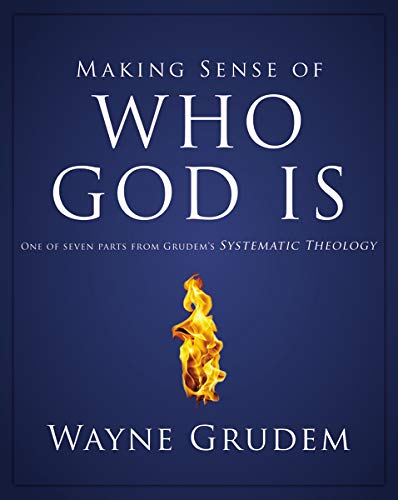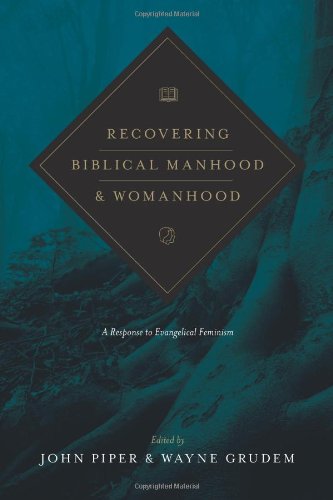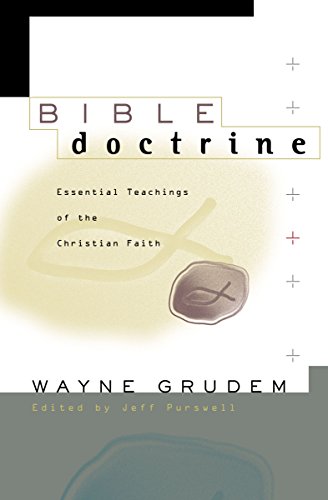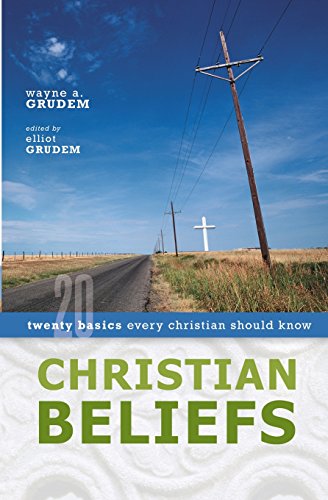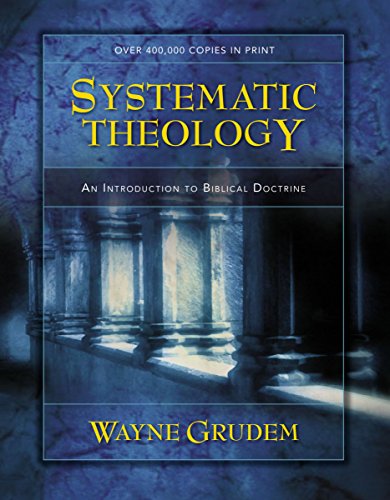
Quotes by Wayne Grudem
No Christian husband should presume to think that any spiritual good will be accomplished by his life without an effective ministry of prayer. And no husband may expect an effective prayer life unless he lives with his wife ‘in an understanding way, bestowing honor’ on her. To take the time to develop and maintain a good marriage is God’s will; it is serving God; it is a spiritual activity pleasing in his sight.
Taken from 1 Peter by Wayne Grudem. Copyright(c) 1997. Used by permission of InterVarsity Press, PO Box 1400, Downers Grove, IL 60515, p. 146.
Christians do not suffer accidentally or because of the irresistible forces of blind fate; rather, they suffer according to God’s will… Therein lies the knowledge that there is a limit to the suffering, both in its intensity and in its duration, a limit set and maintained by the God who is our creator, our savior, our sustainer, our Father.
Benefits of being filled with the Holy Spirit:
1. Spiritual counsel and edifying praise – Eph. 5:19.
2. Frequent worship of God – Eph. 5:19.
3. Constant attitude of thanksgiving – Eph. 5:20.
4. Humility and submission to those in authority – Eph. 5:21-6:9.
5. Greater victory over concentrated spiritual attack – Eph. 6:10-19.
6. More spiritual gifts in the church since the Spirit is the one who gives gifts.
7. More specific understanding of God’s will in the decisions which face us in life – Eph. 1:17, Gal. 5:18.
8. Greater holiness in life – Rom. 8:13.
9. More answers to prayer – Eph. 6:18.
10. Amazingly fruitful ministry – Zech. 4:6.
11. Much greater peace in our hearts – Rom. 8:6.
Adapted From: Being Filled With the Holy Spirit, Sermon Delivered at Bethlehem Baptist, www.DesiringGod.org.
Being filled with the Spirit means to be filled with the immediate presence of God to the extent that you are feeling what God Himself feels, desiring what God desires, doing what God wants, speaking by God’s power, praying and ministering in God’s strength, and knowing with the knowledge that God Himself gives.
Being Filled With the Holy Spirit, Sermon Delivered at Bethlehem Baptist, www.DesiringGod.org.
1. The sufficiency of Scripture should encourage us as we try to discover what God would have us to think or to do. 2. The sufficiency of Scripture reminds us that we are to add nothing to Scripture, and that we are to consider no other writings of equal value to Scripture. 3. The sufficiency of Scripture also tells us that God does not require us to believe anything about Himself or His redemptive work that is not found in Scripture. 4. The sufficiency of Scripture shows us that no modern revelations from God are to be placed on a level equal to Scripture in authority. 5. With regard to living the Christian life, the sufficiency of Scripture reminds us that nothing is sin that is not forbidden by Scripture either explicitly or by implication. 6. The sufficiency of Scripture also tells us that nothing is required of us by God that is not commanded in Scripture either explicitly or by implication. 7. The sufficiency of Scripture reminds us that in our doctrinal and ethical teaching we should emphasize what Scripture emphasizes and be content with what God has told us in Scripture.
In one sense the doctrine of the Trinity is a mystery that we will never be able to understand fully. However, we can understand something of its truth by summarizing the teaching of Scripture in three statements: 1. God is three persons. 2. Each person is fully God. 3. There is one God.
Biblicaltraining.org, www.biblicaltraining.org/library/trinity-wayne-grudem#sthash.xdBao7XT.dpuf. Used by Permission.
Sanctification is a progressive work of God and man that makes us more and more free from sin and like Christ in our actual lives.
Biblicaltraining.org, www.biblicaltraining.org/library/sanctification-wayne-grudem#sthash.LLBUl9Ih.dpuf. Used by Permission.
There is a definite beginning to sanctification at the point of conversion, that sanctification should increase throughout the Christian life, and that sanctification is made perfect at death.
Biblicaltraining.org, www.biblicaltraining.org/library/sanctification-wayne-grudem#sthash.LLBUl9Ih.dpuf. Used by Permission.
God’s speech to us by His Son is the culmination of His speaking to mankind and is His greatest and final revelation to mankind in this period of redemptive history. The exceptional greatness of the revelation that comes through the Son, far exceeding any revelation in the old covenant, is emphasized again and again throughout chapters 1 and 2 of Hebrews. These facts all indicate that there is a finality to the revelation of God in Christ and that once this revelation has been completed, no more is to be expected.
Biblicaltraining.org, www.biblicaltraining.org/library/canon-scripture-wayne-grudem#sthash.akyA4tL7.dpuf. Used by Permission.
When Jesus commands us to be perfect as our Father in heaven is perfect (Matt. 5:48), this simply shows that God’s own absolute moral purity is the standard toward which we are to aim and the standard for which God holds us accountable. The fact that we are unable to attain that standard does not mean that it will be lowered; rather, it means that we need God’s grace and forgiveness to overcome our remaining sin. Similarly, when Paul commands the Corinthians to make holiness perfect in the fear of the Lord (2 Cor. 7:1), or prays that God would sanctify the Thessalonians wholly (1 Thess. 5:23), he is pointing to the goal that he desires them to reach. He does not imply that any reach it, but only that this is the high moral standard toward which God wants all believers to aspire.
Biblicaltraining.org, www.biblicaltraining.org/library/sanctification-wayne-grudem#sthash.LLBUl9Ih.dpuf. Used by Permission.
So what analogy shall we use to teach the Trinity?… It is best to conclude that no analogy adequately teaches about the Trinity, and all are misleading in significant ways.
Biblicaltraining.org, www.biblicaltraining.org/library/trinity-wayne-grudem#sthash.xdBao7XT.dpuf. Used by Permission.
The different functions that we see the Father, Son, and Holy Spirit performing are simply outworkings of an eternal relationship between the three persons, one that has always existed and will exist for eternity. God has always existed as three distinct persons: Father, Son, and Holy Spirit. These distinctions are essential to the very nature of God Himself, and they could not be otherwise… It may be said that there are no differences in deity, attributes, or essential nature between the Father, Son, and Holy Spirit. Each person is fully God and has all the attributes of God. The only distinctions between the members of the Trinity are in the ways they relate to each other and to the creation. In those relationships they carry out roles that are appropriate to each person.
Biblicaltraining.org, www.biblicaltraining.org/library/trinity-wayne-grudem#sthash.xdBao7XT.dpuf. Used by Permission.
But it should also be said that Scripture does not ask us to believe in a contradiction. A contradiction would be “There is one God and there is not one God,” or “God is three persons and God is not three persons,” or even (which is similar to the previous statement) “God is three persons and God is one person.” But to say that “God is three persons and there is one God” is not a contradiction. It is something we do not understand, and it is therefore a mystery or a paradox, but that should not trouble us as long as the different aspects of the mystery are clearly taught by Scripture, for as long as we are finite creatures and not omniscient deity, there will always (for all eternity) be things that we do not fully understand.
Biblicaltraining.org, www.biblicaltraining.org/library/trinity-wayne-grudem#sthash.xdBao7XT.dpuf. Used by Permission.
1. Fasting increases our sense of humility and dependence on the Lord (for our hunger and physical weakness continually remind us how we are not really strong in ourselves but need the Lord). 2. Fasting allows us to give more attention to prayer (for we are not spending time on eating). 3. [Fasting] is a continual reminder that, just as we sacrifice some personal comfort to the Lord by not eating, so we must continually sacrifice all of ourselves to Him. 4. Fasting is a good exercise in self-discipline, for as we refrain from eating food, which we would ordinarily desire, it also strengthens our ability to refrain from sin, to which we might otherwise be tempted to yield. 5. Fasting also heightens spiritual and mental alertness and a sense of God’s presence as we focus less on the material things of this world (such as food) and as the energies of our body are freed from digesting and processing food. 6. Fasting expresses earnestness and urgency in our prayers: if we continued to fast, eventually we would die. Therefore, in a symbolic way, fasting says to God that we are prepared to lay down our lives that the situation be changed rather than that it continue.
Excerpted from: Biblicaltraining.org, www.biblicaltraining.org/library/prayer-wayne-grudem#sthash.B6ILYAVS.dpuf. Used by Permission.
The writings of the Apocrypha should not be regarded as part of Scripture: 1. they do not claim for themselves the same kind of authority as the Old Testament writings; 2. they were not regarded as God’s words by the Jewish people from whom they originated; 3. they were not considered to be Scripture by Jesus or the New Testament authors; and 4. they contain teachings inconsistent with the rest of the Bible. We must conclude that they are merely human words, not God-breathed words like the words of Scripture. They do have value for historical and linguistic research, and they contain a number of helpful stories about the courage and faith of many Jews during the period after the Old Testament ends, but they have never been part of the Old Testament canon, and they should not be thought of as part of the Bible. Therefore, they have no binding authority for the thought or life of Christians today.
Biblicaltraining.org, www.biblicaltraining.org/library/canon-scripture-wayne-grudem#sthash.akyA4tL7.dpuf. Used by Permission.
The role that we play in sanctification is both a passive one in which we depend on God to sanctify us, and an active one in which we strive to obey God and take steps that will increase our sanctification.
Biblicaltraining.org, www.biblicaltraining.org/library/sanctification-wayne-grudem#sthash.LLBUl9Ih.dpuf. Used by Permission.
New Testament commands concerning marriage do not perpetuate any elements of the curse or any sinful behavior patterns; they rather reaffirm the order and distinction of roles that were there from the beginning of God’s good creation.
Systematic Theology, Zondervan, 1994, p. 465. Used by Permission.
Get this book!
If we think it is unfair for us to be represented by Adam, then we should also think it is unfair for us to be represented by Christ and to have His righteousness imputed to us by God.
Systematic Theology, Zondervan, 1994, p. 495. Used by Permission.
Get this book!
Sin is any failure to conform to the moral law of God in act, attitude, or nature… Sin includes not only individual acts such as stealing or lying or committing murder, but also attitudes that are contrary to the attitudes God requires of us.
Systematic Theology, Zondervan, 1994, p. 490. Used by Permission.
Get this book!
Simply to say that we are trusting in God instead of acting responsibly is sheer laziness and is a distortion of the doctrine of providence.
Systematic Theology, Zondervan, 1994, p. 335. Used by Permission.
Get this book!
Therefore, any genuine gospel proclamation must include an invitation to make a conscious decision to forsake one’s sins and come to Christ in faith, asking Christ for forgiveness of sins. If either the need to repent of sins or the need to trust in Christ for forgiveness is neglected, there is not a full and true proclamation of the gospel.
Systematic Theology, Zondervan, 1994, p. 695. Used by Permission.
Get this book!
Conversion is our willing response to the gospel call, in which we sincerely repent of sins and place our trust in Christ for salvation.
Systematic Theology, Zondervan, 1994, p. 709. Used by Permission.
Get this book!
So in a Reformed system God’s highest value is His own glory, and in an Arminian system God’s highest value is the freewill of man.
Systematic Theology, Zondervan, 1994, p. 684. Used by Permission.
Get this book!
So in the presentation of Scripture the cause of election lies in God, and the cause of reprobation lies in the sinner. Another important difference is that the ground of election is God’s grace, whereas the ground of reprobation is God’s justice.
Systematic Theology, Zondervan, 1994, p. 686. Used by Permission. Get this book!
God’s faithfulness means that God will always do what He has said and fulfill what He has promised.
Systematic Theology, Zondervan, 1994, p. 195. Used by Permission.
Get this book!
God’s words are not simply true in the sense that they conform to some standard of truthfulness outside of God. Rather, they are truth itself; they are the final standard and definition of truth.
Systematic Theology, Zondervan, 1994, p. 196. Used by Permission.
Get this book!
What is “good?” “Good” is what God approves. We may ask then, why is what God approves good? We must answer, “Because He approves it.” That is to say, there is no higher standard of goodness than God’s own character and His approval of whatever is consistent with that character.
Systematic Theology, Zondervan, 1994, p. 197. Used by Permission.
Get this book!
God’s mercy is His goodness toward those in distress, His grace in His goodness toward those who deserve only punishment, and His patience in His goodness toward those who continue to sin over a period of time.
Systematic Theology, Zondervan, 1994, p. 198. Used by Permission.
Get this book!
The authority of Scripture means that all the words in Scripture are God’s words in such a way that to disbeliever or disobey any word of Scripture is to disbelieve or disobey God.
Systematic Theology, Zondervan, 1994, p. 73. Used by Permission.
Get this book!
The sufficiency of Scripture means that Scripture contains all the words of God He intended His people to have at each stage of redemptive history, and that it now contains all the words of God we need for salvation, for trusting Him perfectly, and for obeying Him perfectly.
Systematic Theology, Zondervan, 1994, p. 127. Used by Permission.
Get this book!
We are free to use our reasoning abilities to draw deductions from any passage of Scripture so long as these deductions do not contradict the clear teaching of some other passage of Scripture.
We may define God’s providence as follows: God is continually involved with all created things in such a way that He 1. keeps them existing and maintaining the properties with which He created them; 2. Cooperates with created things in every action directing their distinctive properties to cause them to act as they do; 3. Directs them to fulfill His purposes.
Systematic Theology, Zondervan, 1994, p. 315. Used by Permission. Get this book!
The decrees of God are the eternal plans of God whereby, before the creation of the world, He determined to bring about everything that happens. This doctrine is similar to the doctrine of providence, but here we are thinking about God’s decisions before the world was created, rather than His providential actions in time. His providential actions are the outworking of the eternal decrees that He made long ago.
Systematic Theology, Zondervan, 1994, p. 332. Used by Permission.
Get this book!
We can say then that a relationship of authority and submission between equals, with mutual giving of honor, is the most fundamental and most glorious interpersonal relationship in the universe. Such a relationship allows interpersonal differences without “better” or “worse,” without “more important” and “less important.” And when we begin to dislike the very idea of authority and submission—not distortions and abuses, but the very idea—we are tampering with something very deep. We are beginning to dislike God Himself.
It is by far the most amazing miracle in the whole Bible – far more amazing than the resurrection and more amazing than the creation of the universe. The fact that the infinite, omnipotent, eternal Son of God could become man and join Himself to a human nature forever, so that infinite God became one person with finite man, will remain for eternity the most profound miracle and the most profound mystery in all the universe.
Systematic Theology, Zondervan, 1994, p. 563. Used by Permission. Get this book!
We should notice that the alternatives to saying that God uses evil for His purposes, but that He never does evil and is not to be blamed for it, are not desirable ones. If we were to say that God Himself does evil, we would have to conclude that He is not a good and righteous God, and therefore that He is not really God at all. On the other hand, if we maintain that God does not use evil to fulfill His purposes, then we would have to admit that there is evil in the universe that God did not intend, is not under His control, and might not fulfill His purposes… Surely this (too) is an undesirable alternative position.
Systematic Theology, Zondervan, 1994, p. 328-329. Used by Permission. Get this book!
Human beings do cause evil and are responsible for it. Though God ordained that it would come about…yet God is removed from actually doing evil, and His bringing it about through "secondary causes" does not impugn His holiness or render Him blameworthy.
Systematic Theology, Zondervan, 1994, p. 328. Used by Permission. Get this book!
Evangelicals who hold to these various positions [on Christ’s return] all agree that Scripture is inerrant, and they have a commitment to believe whatever is taught by Scripture. Their differences concern the interpretation of various passages relating to these events, but their differences on these matters should be seen as matters of secondary importance, not as differences over primary doctrinal matters.
Systematic Theology, Zondervan, www.zondervan.org, 1994, p. 1095. Used by Permission. Get this book!

